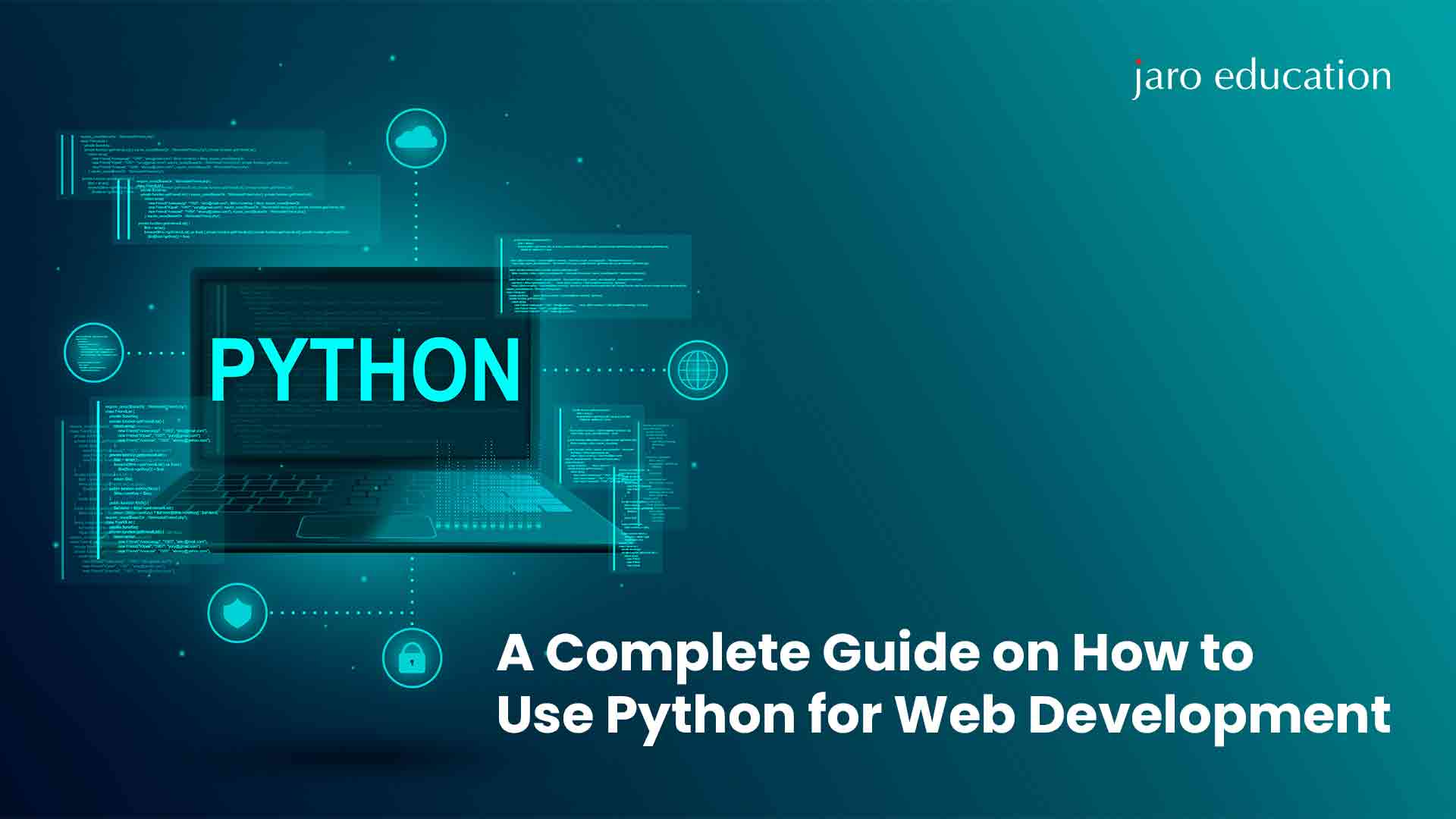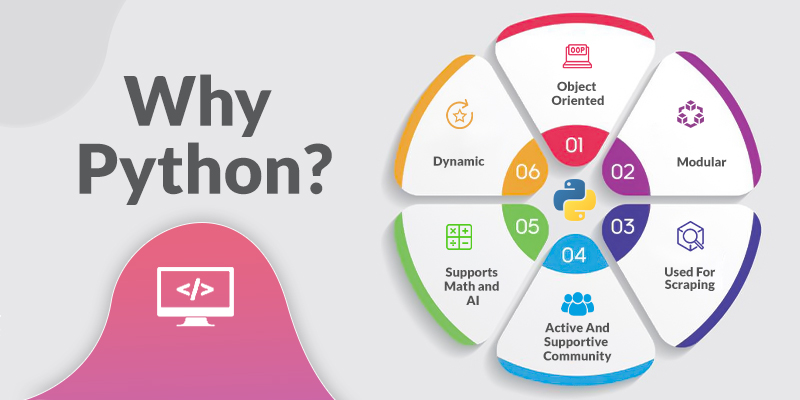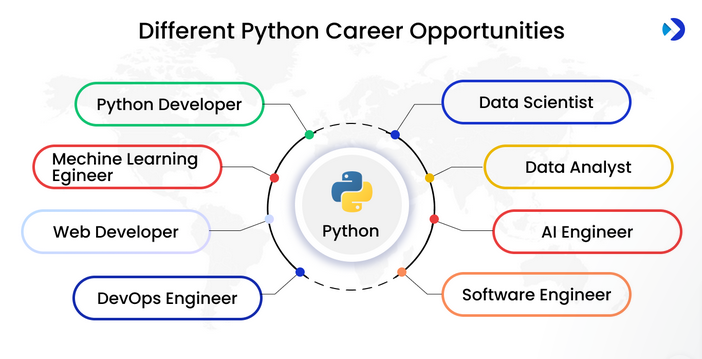A Complete Guide on How to Use Python for Web Development
Table of Contents

- jaro education
- 18, April 2024
- 4:40 pm

*matellio.co.uk
Recently, Python has become one of the most sought-after programming languages. You can regularly use Python for website development, software testing and machine learning programs. Python can be gauged by its popularity in Amazon Prime’s recommendation algorithms and autonomous or self-driving car software.
In simple words, Python is a general programming language used in all types of web development initiatives, including automation, AI, data science and machine learning. Some widely used Python frameworks in web development include Django, CherryPy, Pyramid, Grok and TurboGears. Django is a free, open-source web development framework for developing top-notch, high-quality apps.
CherryPy is also a free-source Python framework regularly used for file uploads, cookies, static content, etc. Pyramid is a simple and flexible web development framework for modern high-tech projects. Grok is another web development framework which relies on ‘Do not Repeat Yourself and Convention’ over configuration principles. This blog will discuss all aspects of Python for web development, including its uses and significance.
What is Python for Web Development?
As discussed, Python is a computer language program with various use cases, such as data analysis, data science, AI, machine learning, software and app development and app testing. An important fun fact is that the name Python is derived from the famous British comedy troupe Monty Python. Guido Van Rossum, the architect of Python, was reading about Monty Python while developing this language. He considered Python short and easy to pronounce for the new programming language.
The flexibility and versatility of Python have made it the most popular computer language program. It can work on many platforms, like Raspberry, Linux, Pi, Mac and Windows. One of the significant advantages of Python is that its syntax is similar to that of the English language and, hence, is easily accessible. Moreover, you can write codes using fewer lines in Python than in other programming languages.
Due to user-friendliness and wide usage, Python has been ranked among the top computer language programs across the world. Python for web development is very popular among beginners as it is easy to write and understand and has fewer coding lines. Now that you are well opposed to the meaning of Python, let’s shift our focus to other aspects of the computer language, like the role of Python web developers, fundamentals of Python, scalability and tips for success.
What is the Role of a Python Developer?
As the name suggests, a Python developer is an individual who is tasked with writing server-side web development codes using the Python programming language. Python developers require several skills, such as database architecture, front-end design, user experience and server-side applications. Apart from this, a Python developer should also understand how to maximise business using these skills. A Python developer can be employed in various roles, such as developing and designing a website, app, games and cutting-edge technologies.
The primary functions of a Python developer are as follows:
- Fixing any error in the code
- Enhancing the performance and effectiveness of an application
- Developing and incorporating new features
- Maintaining an app’s code base
Career Opportunities in Python for Web Development

*codemonk.in
Here are some of the career opportunities in Python for the web development segment:
- Python Developer: These individuals use Python programming for various web development activities, like website and app design & development and machine learning.
- Data Analyst: Python can be used in data analysis due to the presence of dominant libraries NumPy, Matplotlib and Panda. Besides that, it is also used to collect and analyse large datasets.
- Machine Learning Engineer: This is another role in which Python can be helpful. A machine learning engineer uses Python programming to train machine modules to execute complex tasks.
- Full Stack Developer: Python is widely used in full-stack developing jobs. A full-stack developer uses Python in websites and applications’ front-end and back-end.
- DevOps Engineer: Python is used by DevOps engineers to automate the management and scaling of application infrastructure. Cloud computing, containerisation and integration are major projects in which DevOps can use Python.
- Scientific Computing: A scientific computing specialist can use Python to perform complex mathematical calculations and simulations. Different libraries like NumPy, SciPy, and Panda help execute these complex functions.
- Cybersecurity Specialist: Due to its ability to automate tasks and scripts, cybersecurity experts widely use Python. It can be helpful in projects like cloud security, application security and network security.
Essential Skills Required for a Python Developer
Python is considered the most modern and advanced programming language. There are specific skills that a Python developer needs in their armoury to carry out the task efficiently. These have been discussed below:
1. Python Fundamentals
In order to have a deeper understanding of Python for web development programming language, let’s discuss its fundamentals in detail:
- Syntax: It refers to a set of rules that governs the interpretation and writing side of Python. The Syntax is easy to understand and follows the principle that “there should be one and only one definite way to do it.”
- Data Types: There are six different kinds of data types in Python: Numeric, Sequence, Boolean, Set, Dictionary and Binary Types.
- Control Flow: Loops, functions and conditional statements regulate the control flow of the Python program. Execution of instruction happens from start to end or from top to bottom.
- Libraries: Libraries are a collection of modules that help the application code perform specific tasks. Panda, Numpy, Keras, Tensor Flow and Scikit Learn are some of the major libraries used in Python.
- Python Packages: Python packages are a way to structure and organise the Python codes into reusable components. Packages serve as a toolbox where you can store and reuse all your functions.
2. HTML and CSS
If you are interested in Python for web development, then you should understand HTML and CSS, as it will help you use Python frameworks like Django and Flask.
- Basics of Front-End Development: As the name suggests, the front-end is that side of the application or software that the customer sees and interacts with. A front-end developer’s primary responsibility is to design the visual components and develop interactive mechanisms like buttons or navigation.
Every front-end developer should have expert knowledge of HTML, i.e., Hyper Text Markup Language. HTML is a common computer language that is useful in developing pages that one can see using the internet. The site designer has to normalise the HTML codes into standard text to save the regular text as an HTML file. A person on the internet views this HTML file.
- Integrating HTML/CSS With Python Frameworks: There are several ways of integrating Python with HTML. The ways have been discussed below:
- Develop HTML with the help of Python frameworks like Django.
- You can also host any app written using the Python codes in the Google App Engine.
- With the help of the HTML Templating Library for Python, the provided HTML can be passed through any web server like Apache.
3. JavaScript
Like Python, JavaScript is also a programming language through which a web developer can execute complex features on web pages such as animated 3D/4D images, structure-wise timely content, and much more. Let’s look at how exactly JavaScript is incorporated:
- Introduction to Client-side Scripting: This is the process through which the client receives a code sent by the server with the HTML web page. The respective code runs on the client’s system while the webpage is still loading or has completed loading. JavaScript is widely used to create innovative, interactive and secure web pages.
- Interfacing with Python Backend: The web developer must send the JavaScript file with user-generated data to the web browser. After that, pick up any Python web framework like Flask, and once it is running, the web developer needs to direct Java XHR requests to the Python server’s domain and server.
4. Version Control With Git
Version control is the process by which one can track all the changes happening in the software code. Git is the most advanced version control system currently in use. Let’s see in detail the different dimensions of Git and GitHub:
- Basics of Git and GitHub: Linus Torvalds, credited with developing Linux OS Kernel, created Git in 2005 as an open-source version control project. Today, many commercial and open-source projects run on Git version control. Git can work on different OS and Integrated Development Environments.
GitHub is a not-for-profit organisation that provides cloud-based Git repository services. These services help store and track changes occurring to software codes.
Best Practices for Collaborative Development and Version Control: Here are some of the best version control practices that one can follow:
- Select a Version Control System
- Follow Branching Strategy
- Take the help of Commit and Descriptive Messages
- Adopt a Code Style and Format
- Execute the Code Review Policy
- Coordinate and Communicate with the Team
5. Backend Development with Python
Python for web development is becoming a go-to tool for backend developers. It allows for the designing and development of innovative and interactive backend solutions. Many web developers are using Python to create potent server-specific components of web applications. Two of them are mentioned below:
- Flask: This Python framework offers ease of usage and convenience without compromising functionality. It is ideal for small and medium-sized projects because of the emphasis on core components of web development and also comes with minimalist Syntax.
- Django: This Python framework simplifies the process of creating complex web applications. With the help of Django, web developers can quickly implement complex tasks like data management, URL routing and authentication.
6. Database Management
Python offers support mechanisms for various database systems. Python answers our queries related to a particular database without writing queries in the terminal. It would suffice if the database is present in the system. Here are a couple of different ways of database management:
- Working With Database in Python: Databases manage data volumes over the web. SQL is a popular query language used in Python. SQLite is a light or easy-to-use version of SQL. SQLite is a public domain, credible, highly flexible and embedded SQL database engine.
- ORM Frameworks Like SQAlchemy: ORM stands for Object Relation Mapper, and SQAlchemy is a Python library that establishes functional communication between a database and a Python program. SQAlchemy functions as an ORM tool that helps translate Python classes into tables of relational databases. SQAlchemy also converts functional calls into different SQL statements.
7. Web APIs and RESTful Services
APIs are a set of rules that developers need to follow to communicate with other software programs. Web developers must create APIs so that various applications can communicate with their applications systemically. Let’s discuss more about consuming APIs using python and REST principles:
- Creating and Consuming APIs Using Python: The complete form of REST is representational state transfer. This architectural style establishes a pattern for interaction between the client and the server. It helps enhance a software’s reliability, simplicity and performance.
- Understanding REST Principles: Some of the major principles on which REST API functions are given below:
- Resource-based Architecture
- Self-descriptive Messages
- HATEOAS
- Statelessness
- Uniform Interface
These principles ensure simplicity, independence between the server and client components and modularity.
8. Testing and Debugging
Testing means the process of identifying any issues or problems in the application. On the other hand, debugging refers to fixing all the errors and problems found in the software. Testing and debugging has more to it, such as:
- Writing Unit Tests for Python Web Applications: Python is an ideal programming language for unit test writing. PyTest, Unittest and Doctest are significant built-in libraries that can perform unit tests.
- Debugging Techniques and Best Practices: Some of the significant debugging techniques and best practices are as follows:
9. Deployment and DevOps
Now that you know the intricacies of Python for web development, let’s consider the deployment and DevOps of Python in detail.
- Deploying Python Web Application Using AWS: AWS is an umbrella concept encompassing all of Amazon’s cloud computing services. AWS Runner allows developers to fast-track their application launch.
- Basics of Containerisation with Docker: Docker works like a container, and it packages the application and its related components in a composite manner so that it can function effectively and seamlessly in any situation, such as the testing and development phases. Docker was launched in 2013 and is the world’s leading containment platform. Docker is famous among developers and administrators as it makes their lives easy and convenient.
Tips to Become a Successful Python Web Developer
Here are some significant tips that you can use to become a successful Python web developer:
- Continuous Learning and Staying Updated With Industry Trends: In any field, players must stay updated with all the new technologies and developments that have come to the fore. As technologies are dynamic, it is essential to continue learning new skills, reskill yourself and stay relevant.
- Building a Strong Portfolio of Projects: Another tip you can follow is building a diverse and robust project portfolio. Try to work on different projects to have maximum exposure and learn new tricks. It will be beneficial if you have hands-on experience in small and medium projects and some involvement in large projects that use Python for web development.
- Networking and Community Involvement: Networking is the key to career growth. Every Python project has a strong team, and you must develop some formal and informal relations with your team members and learn from each other’s experiences. Additionally, do not end your relationship with your team members when the project ends, and always stay in contact for future collaboration.
- Leveraging Online Resources for Support and Learning Opportunities: Today, you can access innumerable resources online on how to use Python for web development.
Conclusion
Python is one of the most important programming languages that the world has witnessed since the evolution of programming. It is quite popular among beginners and people from non-science backgrounds because of its ease, simple interface and shorter codes compared to its competitors. This blog gives you all the details regarding Python for web development and how you can use it for better career prospects by pursuing Master of Computer Applications (MCA) offered by leading universities like Manipal University Jaipur.
Frequently Asked Questions
Yes, Python is ideal for amateur and beginner web developers because it is easy to learn, write and use. Its flexibility and diverse use cases add to its significance.
The average annual salary that a Python developer can make is Rs. 6 lakhs per annum. The salary band of a Python developer ranges between Rs. 2 lakh – Rs. 10 lakh per annum, as per Ambitionbox.
The primary function of a Python developer is to design codes using Python. Python developers also work on identifying problems and debugging projects. Every Python developer will work closely with several departments, such as data collection, data analytics and others, to offer a wholesome conclusion to a project.
As per many campus and non-campus hiring estimates, Python developers are in great demand among companies. Many companies use automatic systems, and for that, they need the services of a Python developer.
Flask and Django have specific utilities, depending on the project in which they are being used. Some developers prefer Flask over Django and vice versa. Django is the go-to framework for complex and large projects, and Flask is preferred for small projects.









